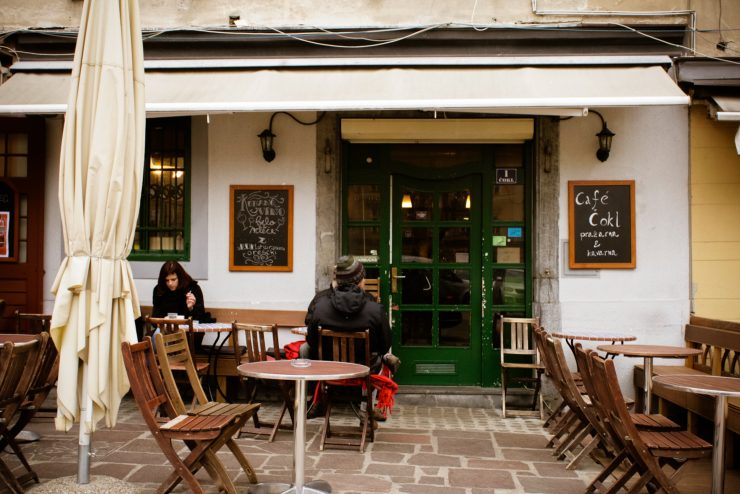
At eight in the morning, tiny Cafe Čokl is already pleasantly cramped. Customers rub elbows on high stools, chattering away in Slovenian. One asks for an “Americano, prosim”; owner Tine Čokl slides him a shot accompanied by a tiny silver pitcher of hot water. Here, what may be standard practice elsewhere is a gentle way of educating customers. “They don’t understand basic espresso anatomy,” he says, referring to what Slovenians typically expect of an Americano—an improbably long shot served in a mug.
Sandwiched between Austria and Italy, tiny Slovenia is one of the last European countries to indulge in specialty coffee. It’s a cultural crossroads where deeply rooted Germanic, Latin, and Slavic traditions tangle. “We like to enjoy Italian beans in an Austrian style,” explains Čokl. “We expect our coffee to be in big cups, filled to the top, but this is something that espresso extraction cannot ensure.”
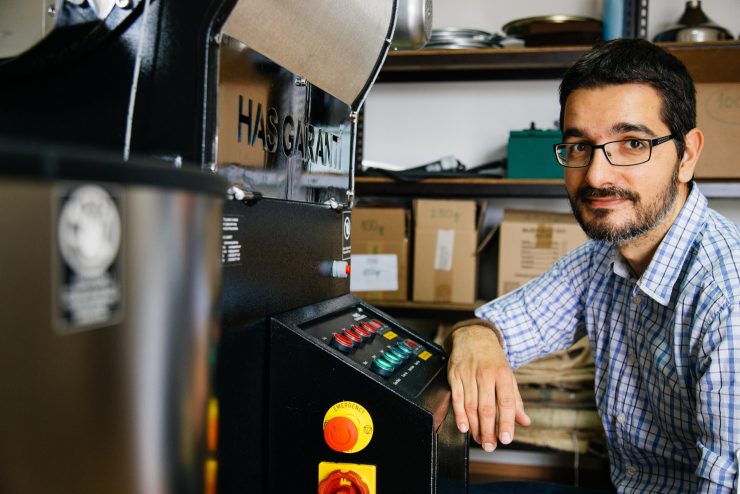
Photo by Veronika Savnik
Čokl started making coffee seven years ago, but volunteering at the World Barista Championship in Vienna in 2012 pushed him to get serious. “I realized I did not really know much about coffee, which was not fair to my customers,” he says. “I would be selling a couple hundred cups daily, but it was not really sincere since I didn’t know much.”
In his quest for sincerity, he started roasting his own coffee in 300-gram batches on his balcony. “It was winter, I was in my jacket and gloves, and trying to have sufficient light with a small flashlight,” he remembers, laughing. Eventually, he upgraded to two-kilogram batches and finally the 15-kilogram Has Garanti HSR15 machine he currently uses to roast two or three batches a week to supply the cafe and seven outside clients.
Čokl is soft-spoken but emphatic. He takes coffee personally. “I connect coffee with my grandmother,” he says. As a Bosnian, she had her own coffee tradition, but in former Yugoslavia, beans were a rare commodity. Slovenians were allowed to cross the border into Italy, but they could only bring back two kilograms of raw coffee beans and two liters of alcohol. So she agreed to swap her booze for someone else’s beans once she was back in the village. “Today, I know this coffee was crappy because I still remember the smell when you opened the bag, of mold,” says Čokl. Still, memories of fragrant roasting coffee beans and his grandmother’s searing hot brass hand-grinder percolated through the years, guiding his own practice.
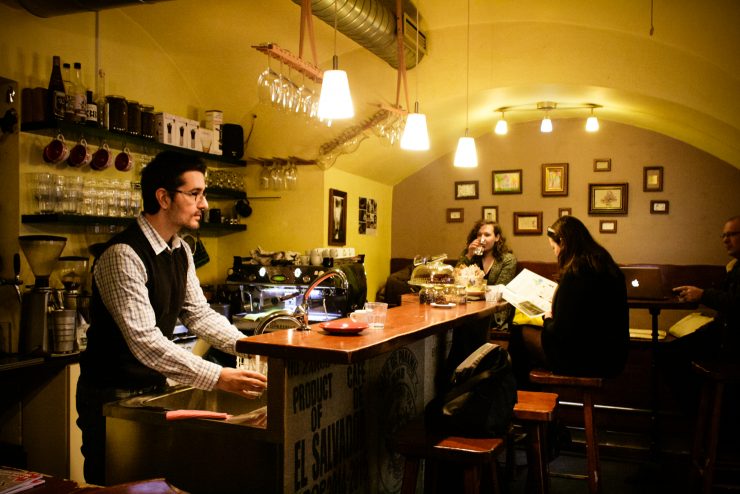
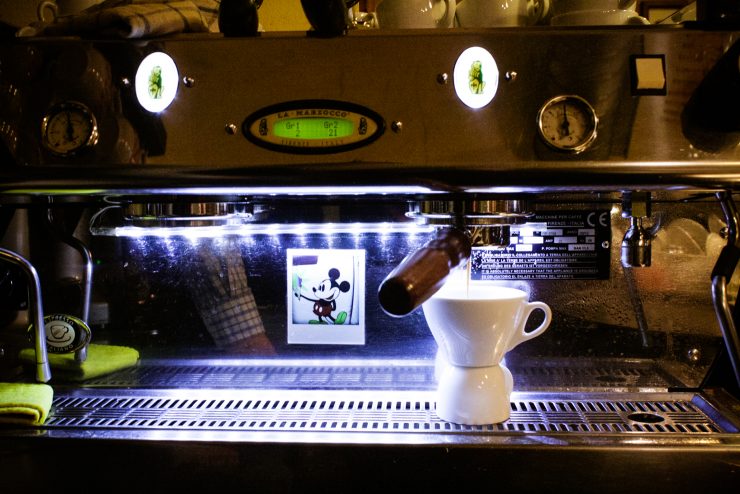
Eschewing diplomas and competitions, Čokl says he has pieced together his coffee education, preferring to invest in quality equipment (La Marzocco GB5 and grinders) and visits to coffee farms (he goes to South America at least once a year). Cafe Čokl sources fair-trade beans through EZA or directly from producers Finca Cocondo, Finca La Granada, Finca Cabaña, and Pavo Realand. The cafe offers eight different extraction methods, including Canadiano wooden pour-overs, and Turkish brew.
I thought Čokl was being pedantic when he said that coffee shops in Ljubljana claim to offer “the best coffee” without anything to back it up. But later that afternoon, I passed a few shop fronts with “Best Coffee in Town” actually chalked out front. As for Čokl, his coffee was the best I had in Ljubljana and on par with anything I’ve had in Paris or New York. It’s this quality, and the reputation it’s slowly bringing the cafe, that has allowed Čokl and his colleague, Živa Lopatič, to use coffee to communicate about issues that are important to them, like fair trade, sustainability, and food waste. “We want to talk about these values and principles, but we couldn’t do that without the quality of the coffee,” says Lopatič, whose work centers around fair trade education and promotion in Slovenia.
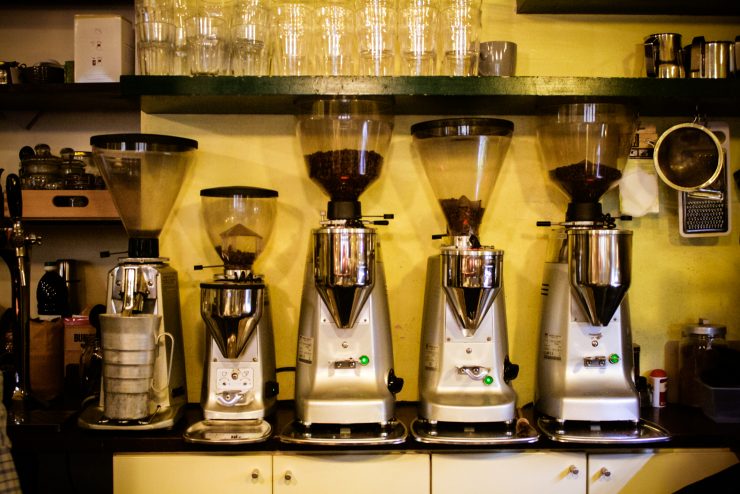
Two years ago, they converted the cafe and coffee distribution to a cooperative under the name Buna. Cooperatives were popular in former Yugoslavia and the structure resonates with Čokl’s idea of running a business today. “It’s about empowerment of people, not a single company owner with a lot of money,” he says. “You give most of the credit to those who are crucial: the workers.”
Čokl plans to meet more farmers this year and find new ways to support the community through coffee. This, too, is personal. “When you meet farmers in person and they shake your hands, and you see the stains of dirt that don’t wash away… you know, my grandmother was a farmer too,” he says.
“Those are the golden hands for me.”
Cafe Čokl is located at Krekov trg 8. Visit their official website and follow them on Twitter and Instagram.
Kate Robinson (@KateOnTheLoose) is a freelance journalist based in Paris. Read more Kate Robinson on Sprudge.
Roasting photos courtesy of Veronika Savnik.
The post Slovenian Coffee On The Rise At Cafe Čokl appeared first on Sprudge.

